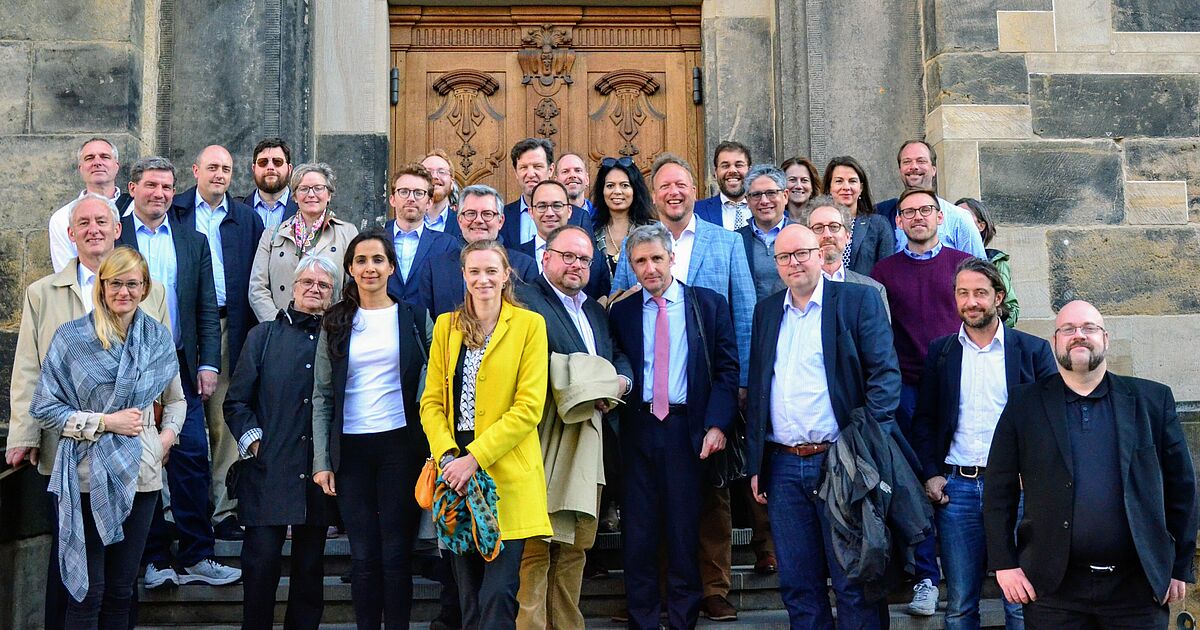“Nothing can replace personal connections across the Atlantic”
In times of transatlantic tension, it is crucial to keep dialogue open on as many levels as possible, especially between individuals. The Global Atlanticists Network, is a group of high-achieving mid-career figures from politics and government, academia, think-tanks, trade, industry, and trade unions, committed to transatlantic cooperation and dialogue. The Washington DC-based Network, a flagship programme of the Friedrich-Ebert-Stiftung, emerged more than a decade ago from a previous crisis in transatlantic relations. Its growth has been influenced by the challenges faced by friends on both sides of the Atlantic in the years since.
“We wanted to create a network that would be an alternate channel for dialogue,” recalls Knut Panknin, a programme officer and coordinator of the Global Atlanticists Network since 2005. We asked him about the Network following its 18th annual meeting in April.
What is the Global Atlanticists Network?
The Global Atlanticists was originally envisioned as a ‘next generation’ network of leaders. That isn’t exactly a new or novel concept, which is why we gave the network a name that reflected the specific transatlantic dialogue we were creating, but that also reflected the international rather than intergenerational qualities of the network.
What were the idea and priorities behind the network?
The network was launched out of the FES DC office in 2003, when US relations with Germany and with the rest of Europe were at their most significant low point before the Trump administration. Germany’s decision to forego participation in the Iraq War was deeply unpopular in Washington, and this strain on the relationship highlighted the need to keep Transatlantic dialogue active at all levels, not just within government channels.
The original focus of the network was exclusively on foreign and security policy. Notably, this included migration, already a foreign policy and security concern.
“Over many years and 18 programmes, we have probably engaged with about 300 unique participants. But even a well-established network does not automatically or organically maintain itself.”
We wanted the network to be bipartisan in the US and multi-partisan in its international composition. We invited people to the network who were committed to democratic values, rules-based systems, and pluralistic discussion. Over time, a core group of participants emerged, people who would attend consistently. One of the challenges now is managing, maintaining and renewing the network all at the same time. Over many years and 18 programmes, we have probably engaged with about 300 unique participants. But even a well-established network does not automatically or organically maintain itself.
A priority for the network was—and still is—creating a safe and candid space for frank discussion and dialogue that typically does not exist outside of diplomatic protocols. As a result, very few direct statements or written projects have emerged from the Global Atlanticists for public consumption or publication. The great value of the Network is the interpersonal relationships and contacts that are developed, so that expertise can be shared even outside of the annual meetings. Members of the Network can and often do consult each other; it is a great professional resource.
How have the priorities of the network developed?
The thematic focus of the Network has expanded in significant ways, from the nature of international relations and partnership, to the importance of economic policy, to the interrelatedness of foreign and domestic policy.
“Transatlantic relations do not just happen bilaterally any more. US-German or US-EU diplomacy must take into account foreign policies towards other states.”
First, we realized after a few years that Transatlantic relations do not just happen bilaterally any more. US-German or US-EU diplomacy must take into account foreign policies towards other states. We have met in China, Russia, Turkey and Morocco, among other places, to discuss what were on the one hand Transatlantic foreign policy issues, but were on the other hand policies towards third parties or joint challenges for Transatlantic partners. We wanted to include these partners’ perspectives in such a “trialogue”, and not just talk around them.
Second, the financial crisis forced us into the realization that economic policy had to be included in the Network and that meant including unions and business perspectives. These challenges and topics had not been included in our original conception of security and international relations. So there was also a thematic expansion in economic and financial policy, trade and labour policy.
A third major realization emerged that foreign policy is tied to domestic policy. To understand a foreign policy position requires consideration of the domestic political debates and concerns, broadly speaking, of the national public, whether in Germany or the US. This also means that members of the Network also inevitably put domestic policy issues on the agenda. A good example for this is our different approaches to questions of migration and integration.
These realizations eventually led us to a programmatic choice for our meetings; to tie discussion topics to the places we meet. When you discuss, for example, right-wing populism while in Dresden, Germany, or political Islam in Morocco, something that is visible and real at the location of the discussion, then there is an added sense of urgency and a deeper understanding. This can result in a very immersive, direct, and powerful experience. You realize what you are talking about is not abstract at all, but really impacting people.
What were some highlights of the 2019 Global Atlanticists Network Meeting?
It was exciting to engage with current political challenges in our stops in Berlin, Dresden, and Paris. It was a kind of culmination of those realizations I just mentioned.
Our discussion of right-wing populism in Germany was particularly interesting, and covered the structural-political as well as historical context. A more universal theme that emerged in Dresden as well as Paris was that many people in our societies feel that their vote does not matter and check out of the political process. They protest but they won’t engage constructively in a community on any level, be it local or municipal politics, or civil society.
In Paris, we met not only with representatives from the French government, but also the Paris municipal government, who emphasized the possibilities of city-to-city cooperation and best practice exchange on everything from climate policy and transport to migration.
A takeaway from this year’s meeting, and really the central lesson of the entire Network, is that there are many positive ideas for an uncertain future, especially on an interpersonal level. Nothing can replace personal experience and connections with our partners across the Atlantic.
###
For more information on the Global Atlanticists program and the work by FES in the United States and Canada, contact the FES office in Washington DC and follow their Facebook page for daily updates.
About FES Connect
Connecting people, in the spirit of social democracy, we source and share content in English from the German and international network of the Friedrich-Ebert-Stiftung.






